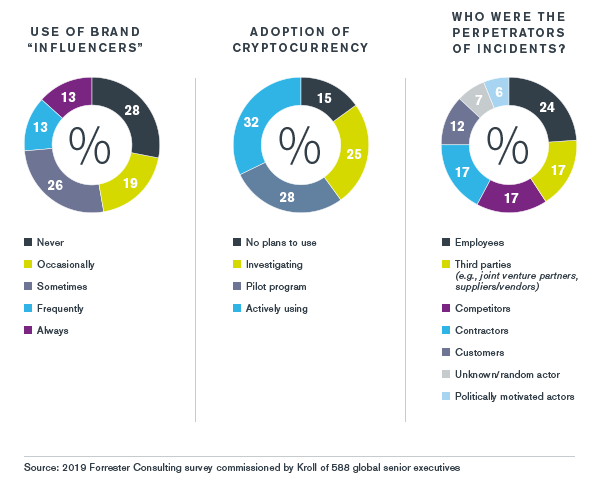Because professional services—law firms, accounting firms, consulting firms and the like—often have access to clients’ sensitive and confidential information, these organizations constitute high-value targets for bad actors seeking inside knowledge on the business strategy and dealings of other entities. According to our survey, the rate at which professional services firms experienced significant data theft in the past year far outstrips that of any other industry (42 percent vs. 29 percent for all industries). And while the likelihood is comparatively small that the professional services industry has experienced disruption due to sanctions, tariffs or changes in trade agreements (17 percent vs. 27 percent for all industries), these firms have felt the effect of two geopolitical factors: restrictions on foreign investment (53 percent vs. 47 percent for all industries) and government influence on a vendor, partner, customer or other entity with which the firm does business (57 percent vs. 51 percent for all industries).

The professional services industry is unique in that even very large firms are essentially aggregations of individual practitioners. This can make it challenging to establish a firm-wide culture. Perhaps that explains why a relatively small share of professional services respondents believe that their firm’s behavior promotes a culture of transparency and accountability. A lower percentage of respondents in professional services than in any other industry report that they get a clear message from the top of their organizations that integrity, compliance and accountability are important (68 percent vs. 78 percent for all industries), that employees view risk management processes as being effective (68 percent vs. 76 percent for all industries) and, along with the construction industry, that risk management programs are designed with input from those who must conform to them (64 percent vs. 74 percent for all industries).
Professional services firms have begun to incorporate social media into their communications strategies, and these firms are more likely than average to say they always use social media influencers (13 percent vs. 9 percent for all industries). However, skeptics remain: A larger-than-average percentage also say they never use them (28 percent vs. 22 percent for all industries). And when the professional services industry uses influencers or brand ambassadors, it is more likely than any other industry to conduct reputational due diligence on them (95 percent vs. 85 percent for all industries).
